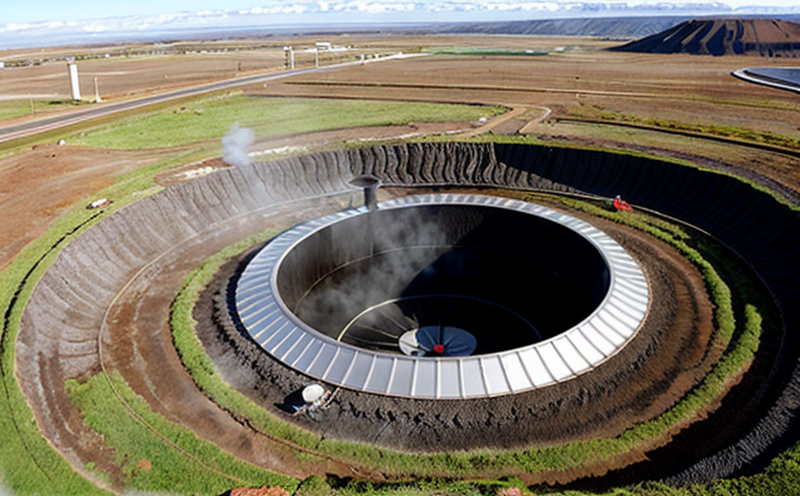EN 50160 Voltage Quality Testing for Geothermal Plants
The European Standard EN 50160 is a cornerstone in ensuring voltage quality, which directly impacts the reliability and efficiency of electrical systems. This standard sets out requirements to ensure that voltages at all points within an electricity supply system are maintained within specified limits under both normal operating conditions and during disturbances.
For geothermal plants, maintaining voltage quality is crucial due to their role in providing a consistent and reliable power supply. Voltage fluctuations can lead to increased energy consumption, reduced plant efficiency, and even damage to critical equipment. Therefore, compliance with EN 50160 is essential for the successful operation of geothermal facilities.
The testing process involves several steps that are tailored specifically for geothermal plants. These include preliminary inspections, detailed voltage measurements under various operating conditions, analysis of harmonic content, and evaluation against the standards set out in EN 50160. The goal is to ensure that all aspects of the plant’s electrical system meet or exceed the specified quality parameters.
During testing, it's important to consider the unique characteristics of geothermal plants such as their location, which can be remote and isolated. This necessitates robust infrastructure capable of withstanding harsh environmental conditions while maintaining voltage stability. Additionally, the integration of renewable energy sources introduces additional challenges that must be addressed through thorough testing.
Instrumentation plays a pivotal role in this process. High-precision measurement devices are used to monitor voltages at critical points across the plant. These instruments not only provide accurate data but also enable continuous monitoring, which is crucial for identifying and addressing any issues promptly.
| Test Parameter | Description | Acceptance Criteria (EN 50160) |
|---|---|---|
| Voltage Limits | The range within which the voltage must be maintained. | ±5% for 90% of the time over a year. |
| Harmonic Content | The level of harmonic distortion allowed in the supply voltage. | No more than 2% total harmonic distortion (THD). |
| Frequency Deviations | The allowable deviation from nominal frequency during specified periods. | +/-0.5 Hz for 99.8% of the time over a year. |
The testing process also involves detailed documentation and reporting, which are essential for maintaining compliance with regulatory requirements. Reports should include comprehensive data on all tested parameters along with any deviations from acceptable limits and recommendations for corrective actions if necessary.
Why It Matters
Maintaining voltage quality is critical for the optimal performance of geothermal plants. Poor voltage quality can result in increased operational costs, reduced efficiency, and potential damage to equipment. Ensuring compliance with EN 50160 helps mitigate these risks by providing a framework for consistent and reliable power supply.
From an environmental perspective, maintaining high voltage quality contributes to the sustainability of geothermal energy production. By ensuring that the electricity generated from this renewable source is delivered efficiently and reliably, we can maximize its contribution towards reducing greenhouse gas emissions.
In addition to these benefits, adherence to EN 50160 also enhances safety standards within the plant. Proper voltage management helps prevent electrical accidents and ensures a safer working environment for all personnel involved in operations.
Benefits
- Enhanced Reliability: Ensures consistent power supply, minimizing downtime and maintenance costs.
- Increased Efficiency: Optimizes the performance of geothermal plants leading to higher output levels.
- Cost Savings: Reduces energy losses and operational expenses by improving overall system efficiency.
- Compliance Assurance: Ensures compliance with international standards, reducing legal risks associated with non-compliance.
- Safety Improvement: Helps maintain safe working conditions through better voltage management practices.
Use Cases and Application Examples
EN 50160 Voltage Quality Testing finds application in various scenarios involving geothermal plants. Here are some typical use cases:
- New Plant Commissioning: Ensures the newly installed equipment meets all quality standards before it goes live.
- Periodic Maintenance: Regular checks help identify and rectify any emerging issues early on, preventing major failures later.
- Upgrades & Modifications: When making changes to existing systems, testing ensures that the modifications do not adversely affect voltage quality.
- Incident Investigation: After an incident occurs, testing helps determine whether it was related to voltage quality issues and takes appropriate corrective measures.





